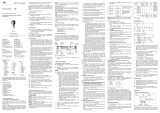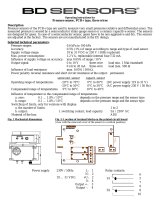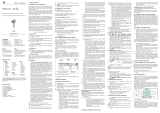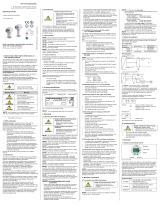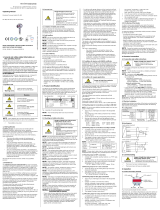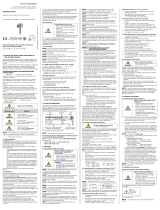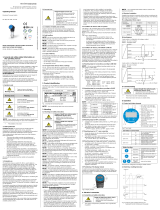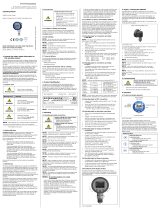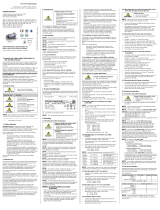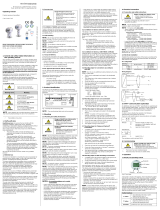
Operating Manual
Electronic Pressure Switch
CCP-K-20 CCP-P-201, 1P,
CCP-P-210, CCP-P-217
Table of contents
1. General information
2. Product identification
3. Mechanical installation
4. Electrical Installation
5. Initial start-up
6. Operation
7. Placing out of service
8. Maintenance
9. Service / Repair
10. Disposal
11. Warranty conditions
12. Declaration of conformity / CE
1. General information
1.1 Information on the operating manual
This operating manual contains important information on
proper usage of the device. Read this operating manual
carefully before installing and starting up the pressure
measuring device.
Adhere to the safety notes and operating instructions which
are given in the operating manual. Additionally applicable
regulations regarding occupational safety, accident preven-
tion as well as national installation standards and engineer-
ing rules must be complied with!
This operating manual is part of the device, must be kept
nearest its location, always accessible to all employees.
This operating manual is copyrighted. The contents of this
operating manual reflect the version available at the time of
printing. It has been issued to our best knowledge. The
manufacturer is not liable for any incorrect statements and
their effects.
– Technical modifications reserved –
1.2 Symbols used
DANGER! – dangerous situation, which may result in
death or serious injuries
WARNING! – potentially dangerous situation, which
may result in death or serious injuries
CAUTION! – potentially dangerous situation, which may
result in minor injuries
! CAUTION! – potentially dangerous situation, which may
result in physical damage
NOTE – tips and information to ensure a failure-free
operation
1.3 Target group
WARNING! To avoid operator hazards and damages of
the device, the following instructions have to be worked
out by qualified technical personnel.
1.4 Limitation of liability
By non-observance of the operating manual, inappropriate
use, modification or damage, no liability is assumed and
warranty claims will be excluded.
NOTE - The device is state-of-the-art and is operationally
reliable. Residual hazards may originate from the device if it
is used or operated improperly.
1.8 Scope of delivery
Check that all parts listed in the scope of delivery are inc-
luded free of damage, and have been delivered according to
your purchase order:
1.9 UL approval (for devices with UL Marking)
The UL approval was effected by applying the US standards,
which also conform to the applicable Canadian standards on
safety.
Observe the following points so that the device meets the
requirements of the UL approval:
- only indoor usage
- maximum operating voltage: according to data sheet
- The device must be operated via a supply with energy
limitation (acc. to UL 61010) or an NEC Class 2 energy
supply.
1.10 Package contents
Please verify that all listed parts are undamaged included in
the delivery and check for consistency specified in your
order:
- electronic pressure switch
- for mechanical pressure ports DIN 3852: o-ring
(pre-assembled)
- mounting instructions
2. Product identification
The device can be identified by its manufacturing label.
It provides the most important data. By the ordering code the
product can be clearly identified. The programme version of
the firmware, (e. g. P07) will appear for about 1 second in the
display after starting up the device. Please hold it ready for
inquiry calls.
Fig. 1 manufacturing label
! The manufacturing label must not be removed from the
device!
3. Mechanical installation
3.1 Mounting and safety instructions
WARNING! Install the device only when depressurized
and currentless!
WARNING! This device may only be installed by
qualified technical personnel who has read and under-
stood the operating manual!
Oxygen
DANGER! Explosion hazard, with devices for oxygen
applications, when used improperly. To ensure a usage
without danger, the following points must be adhered to:
- Make sure, your device has been ordered and de-
livered as a special version for oxygen applica-
tions. You can check the manufacturing label (see
figure 1). If the ordering code ends with "007", then
the device is suitable for oxygen applications.
- At time of delivery the device is packed into a plas-
tic bag in order to prevent it from impurity. Please
observe the indication label "Device for oxygen,
unpack only directly before assembling". Also,
avoid any skin contacts during unpacking and as-
sembly, in order to prevent greasy residues on the
device.
- During installation, the respective explosion protec-
tion regulations have to be met. Check, if ATEX-
approval is necessary for this type (oxygen) device.
(the delivered device has no ATEX-approval)
- Note the entire design requirements meet the
standard demand of BAM (DIN 19247).
- For oxygen applications over 25 bar are recom-
mended pressure transmitter without seals.
- Transmitters with o-rings of 70 EPDM 281:
permissible maximum values: 15 bar/ 60° C and
10 bar/ 60 up to 90°C.
- Transmitters with o-rings of FKM Vi 567:
permissible maximum values: 15 bar/ 60° C.
! Handle this high-sensitive electronic precision
measuring device with care, both in packed and
unpacked condition!
! There are no modifications/changes to be made on the
device.
! Do not throw the package/device!
! To avoid damaging the diaphragm, remove packaging
and protective cap only directly before starting up the
device. A delivered protective cap must be stored!
! Place the protective cap on the pressure port again
immediately after disassembling.
! Handle the unprotected diaphragm very carefully - it is
very sensitive and may be easily damaged.
! The measuring point must be designed in such a way
that cavitation and pressure surges are avoided.
! Do not use any force when installing the device to pre-
vent damage of the device and the plant!
! The display and the plastic housing are equipped with
rotational limiters. Please do only rotate the display or
the housing within the limit.
the connected device.)
! For installations outdoor and in damp areas following
these instructions:
- To prevent moisture admission in the plug the de-
vice should be installed electrically after mounting,
at once. Otherwise a moisture admission has to be
blocked e.g. by using a suitable protection cap.
(The ingress protection in the data sheet is valid for
3.2
3.4
- Choose an assembly position, which allows the
flow-off of splashed water and condensation. Avoid
permanent fluid at sealing surfaces!
- When using a cable gland device, turn the outgoing
cable downwards. If the cable has to be turned
upwards, then point it downward so the moisture
can drain.
- Install the device in such a way that it is protected
from direct solar irradiation. Direct solar irradiation
can lead to the permissible operating temperature
being overstepped in the worst case. By this the
operability of the device can be affected or dam-
aged. If the internal pressure increases due to so-
lar irradiation, measurement errors may be caused.
! For devices with gauge reference in the housing (small
hole next to the electrical connection), install the device
in such a way, that the gauge reference is protected
from dirt and moisture. Should the device be exposed to
fluid admission, the functionality will be blocked by the
gauge reference. An exact measurement in this condi-
tion is not possible. Furthermore this can lead to dam-
ages on the device.
Take note that no inadmissibly high mechanical
stresses occur at the pressure port as a result of the
installation, since this may cause a shifting of the
characteristic curve or to the demage. This is especially
important for very small pressure ranges as well as for
devices with a pressure port made of plastic.
In hydraulic systems, position the device in such a way
that the pressure port points upward (ventilation).
Provide a cooling line when using the device in steam
piping.
If installing the device outdoor and there is any danger
of lightning or overpressure we suggest putting a
overpressure protection unit between the supply/switch
cabinet and the device to prevent damage.
If the device is installed with the pressure connection
up, it has to be made sure that no liquid drain off at the
case. Humidity and dirt can block the relative cover in
the case and it could lead to malfunctions through this.
Dust and dirt must be removed from the edge of the
thread connection of the electrical connection if re-
quired.
General installation steps
- Carefully remove the pressure measuring device from
the package and dispose of the package properly.
- Go ahead as detailed in the specific instructions below.
3.3 Installation steps for DIN 3852
DO NOT USE ANY ADDITIONAL SEALING MATERI-
ALS, LIKE YARN, HEMP OR TEFLON TAPE!
- Check to ensure the proper groove fitting of the o-ring
and additionally to ensure no damage to the o-ring.
- Ensure that the sealing surface of the taking part is
perfectly smooth and clean. (RZ 3.2)
- Screw the device into the corresponding thread by
hand.
- If you have a device with a knurled ring, the transmitter
has to be screwed in by hand only.
- Devices with a spanner flat have to be tightened with an
open-end wrench (wrench size of steel: G1/4": approx.
5 Nm; G1/2": approx. 10 Nm; G3/4": approx. 15 Nm;
G1": approx. 20 Nm; wrench size of plastic: max. 3 Nm).
- The indicated tightening torques must not be
exceeded!
Installation steps for EN 837
- Use a suitable seal, corresponding to the medium and
the pressure input (e. g. a cooper gasket).
- Ensure that the sealing surface of the taking part is
perfectly smooth and clean. (RZ 6.3)
- Screw the device into the corresponding thread by
hand.
- Tighten it with a wrench (for G1/4": approx. 20 Nm; for
G1/2": approx. 50 Nm).
- The indicated tightening torques must not be
exceeded!
NOTE - Please refer to data sheet or contact sales depart-
ment at Simex regarding max. permitted pressure of device.
3.5 Installation steps for NPT
- Use a suitable seal (e. g. a PTFE-strip).
- Screw the device into the corresponding thread by
hand.
- Tighten it with a wrench (for 1/4" NPT: approx. 30 Nm;
for 1/2" NPT: approx. 70 Nm).
- The indicated tightening torques must not be
exceeded!
3.6 Installation steps for dairy pipe
- Check to ensure that the O-ring fits properly into the
intended groove in the mounting part.
- EHEDG conformity is only ensured in combination with
an approved seal. This is e.g.:
- ASEPTO-STAR k-flex upgrade seal by Kieselmann
GmbH
- Centre the dairy pipe connection in the counterpart.
- Screw the cup nut onto the mounting part.
- Then tighten it with a hook wrench.
3.7 Installation steps for Clamp and Variventâ
- Use a suitable seal corresponding to the medium and
the pressure input.
- Put the seal onto the corresponding mounting part.
- Centre the Clamp or Variventâconnection on the fitting
counterpart with seal.
EHEDG conformity is only ensured in combination with
an approved seal. This is e.g.:
for Clamp connections: T-ring seal from Combifit Inter-
national B.V.
- for Varivent connections: EPDM-O-ring which is FDA-
listed
- Note, that P40 can only be used for tank flanges.
- Then fit the device with a suitable fastening element
(e. g. semi-ring or retractable ring clamp) according to
the supplier’s instructions.
3.8 Conditions for devices with 3-A symbol and / or
EHEDG certificate
- The device or its connecting piece must be installed in
such a way that the surfaces are self-draining (permissible
installation position 273° … 87°).
- Make sure that the welding socket is mounted flush inside
the tank.
- The user is responsible for:
- the correct size of the seal and the choice of an elastomeric
sealing material that complies with the 3-A and / or EHEDG
standard(s)
- an easy to clean installation position of the pressure switch
with little dead space, as well as definition / verification /
validation of a suitable cleaning process
- defining adequate service intervals
3.9 Positioning of the display module
The display module is rotatable so that clear readability is
guaranteed even on unusual installation positions. The
display module can be turned as shown below.
Fig. 2 display module
3.10 Conditions for devices, with EHEDG certificate
Install the device according to the requirements given in
EHEDG Guidelines 8, 10 and 37. That is to mount the device
in a self-draining orientation. The device should be installed
flush to the process area. If mounting in a T-piece, the ratio
between the depth of the upstand (L) and the diameter (D) of
the upstand shall be L/D<1. If welded adapters are used, the
food contact surface must be smooth, and the welding has to
be done according to EHEDG Guideline 9 and 35. Suitable
pipe couplings and process connections must be applied
according to the EHEDG Position Paper. (List the available
ones.)
4. Electrical installation
WARNING! Install the device only when depressurized
and currentless!
Establish the electrical connection of the device according to
the technical data shown on the manufacturing label, the pin
configuration and the wiring diagram.
Pin configuration:
Electrical
connections
M12x1
plastic
(5-/8-pin)
M12x1
metal
(5-pin)
ISO
4400
cable
colours
(DIN
47100)
Supply +
Supply –
3-wire: Signal +
Contact 1
Contact 2
Contact 3
Contact 4
1
3
2
4
5
6 1
7 1
1
3
2
4
5
-
-
1
2
3
3
-
-
-
wh (white)
bn (brown)
gn (green)
gr (grey)
pn (pink)
-
-
Shield via
pressure
port
plug-
housing/
pressure
port
ground
contact
gn/ye
(green/
yellow)
1 for 8-pin plug
Wiring diagrams:
2-wire-system (current)
3-wire-system (current/voltage)
! For devices with cable gland as well as cable socket,
you have to make sure that the external diameter of the
used cable is within the allowed clamping range.
Moreover you have to ensure that it lies in the cable
gland firmly and cleftlessly!
! For the installation of a device with cable outlet following
bending radiuses have to be complied with:
cable without ventilation tube:
static installation : 5-fold cable diameter
dynamic application: 10-fold cable diameter
cable with ventilation tube:
static installation : 10-fold cable diameter
dynamic application: 20-fold cable diameter
! Please note for devices with ISO 4400 plug and cable
socket, that the socket has to be mounted properly to
ensure the ingress protection mentioned in the data
sheet. Please check if the delivered seal is placed
between plug and cable socket. After connecting the
cable fasten the cable socket on the device by using the
screw.
! Prevent the damage or removal of the PTFE filter which
is fixed over the end of the air tube on devices with
cable outlet and integrated air tube.
For the electrical connection a shielded and twisted
multicore cable is recommended.
If a transition is desired from a transmitter cable with
gauge tube to a cable without gauge tube, we
recommend our terminal box KL 1 or KL 2.
5. Initial start-up
WARNING! Before start-up, the user has to check for
proper installation and for any visible defects.
WARNING! The device can be started and operated by
authorized personnel only, who have read and under-
stood the operating manual!
WARNING! The device has to be used within the
technical specifications, only! (check the technical data
in the data sheet)!
supply+
signal +
contact 1
VS
A/V
p
I/U
supply –
contact 2
RL RL
contact 3
contact 4
RL RL
p
I
VS
supply +
supply –
contact 1
contact 2
RL
RL
A
ordering
code
connector pinout
type
designation
supply
nominal
pressure
range
signal
serial
number
READ THOROUGHLY BEFORE USING THE DEVICE
KEEP FOR FUTURE REFERENCE
SIMEX Ltd., Wielopole 11, 80-556 Gdańsk, Poland,
tel. (+48) 58 762-07-77, www.simex.pl
SIMEX Sp. z o.o. - All rights reserved
Version: CCP-P-2XX_INSSXEN_v.1.00.000
CCP-P-200 CCP-P-200, P,
1.5 Intended use
-
- The device is intended for converting the physical pa-
rameter of pressure into an electric signal. The current
system pressure is shown in a 4-digit LED-display.
- The device has to be used only for this purpose, consid-
ering the following information.
- Devices with 3-A and / or EHEDG certified process con-
nection have been developed especially for applications
in food and pharmaceutical industry. The process con-
nection is hygienic and can be sterilized.
Permissible measuring and cleaning media are gases or
liquids, which are compatible with the media wetted
parts of the device (according to data sheet) and your
system. This must be ensured for the application.
- It is the operator's responsibility to check and verify the
suitability of the device for the intended application. If
any doubts remain, please contact our sales department
in order to ensure proper usage. The manufacturer is
not liable for any incorrect selections and their effects!
- Permissible media are gases or liquids, which are com-
patible with the media wetted parts described in the data
sheet. In addition it has to be ensured, that this medium
is compatible with the media wetted parts.
- The technical data listed in the current data sheet are
engaging. If the data sheet is not available, please order
or download it from our homepage.
(http://www.simex.pl)
WARNING! – Danger through improper usage!
- Only use the device in permissible media and in
accordance with its intended use.
- Do not use the device as a ladder or climbing aid.
- The device must not be altered or modified in any way.
- The manufactur e r is not liable for damage caused by
improper or incorrect use.
- electronic pressure switch
- for mechanical pressure ports DIN 3852: O-Ring (pre-
mounted)
- mounting instructions or operating manual
1.6 Limitation of liability and warranty
Failure to observe the instructions or technical regulations,
improper use and use not as intended, and alteration of or
damage to the device will result in the forfeiture of warranty
and liability claims.
1.7 Safe handling
NOTE - Do not use any force when installing the device to
prevent damage of the device and the plant!
NOTE - Treat the device with care both in the packed and
unpacked condition!
NOTE - Do not throw or drop the device!
NOTE - Excessive dust accumulation and complete
coverage with dust must be prevented!
NOTE - Never use the display as a mounting / dismounting
aid, otherwise the device may be irreparably damaged. For
mounting or dismounting the device, only use the hexagon
on the pressure port.
The electronic pressure switch has been CCP-P-2XX
developed, according to the type for applications, for
absolute, vacuum and overpressure measurement. It is
equipped with a 4-digit LED-display to show the current
system pressure. Depending on the device and the
mechanical connection it is suitable for various areas of
use.
SIMEX Sp. z o.o., 80-556 Gdańsk, ul. Wielopole 11
Poland, tel. (+48 58) 762-07-77, www.simex.pl
Input: 0 ... 25 bar gauge
Output: 4 ... 20 mA / 3 wire
Supply: 19 ... 30V DC
CCP-P-200 SN: 2292090780-2502-7-2-3-N01-500-1-000
Connector Pinout:
Vs+ : 1
Vs- : 3
S+ : 2
SP1 : 4
SP2 : 5
Shield : case
G1/4" EN 837
p ≤ 600 bar
Counterpart has to be of steel
according to DIN 17440 with
strength Rp0.2 ≥ 190 N/mm2
G1/2" EN 837
p ≤ 1000 bar
G1/4" EN 837
p > 600 bar,
p ≤ 1000 bar
Counterpart has to be of
steel according to DIN
17440 with strength Rp0.2 ≥
260 N/mm2
G1/2" EN 837
p > 1000 bar
p ≤ 1600 bar
CCP-P-200

contact is active. The display of the measured value as well
as the configuration of the individual parameters occurs
menu-driven via the seven-segment display.
6.2 Configuration
The menu system is a closed system allowing you to scroll
both forward and backward through the individual set-up
menus to navigate to the desired setting item. All settings are
permanently stored in an EEPROM and therefore available
again even after disconnecting from the supply voltage. The
structure of the menu system is the same for all types of
devices, regardless of the number of contacts. However,
they only differ by the number of menus. Following figure and
the menu list shows all possible menus. On devices with
3-wire output 4 ... 20 mA and 0 ... 20 mA, the menus ZP and
EP have special functions. The menu DP is not applied, as
the decimal point is already factory set during production.
Please follow the manual meticulously and remember
that changes of the adjustable parameters (switch-on
point, switch-off point, etc.) become only effective after
pushing both buttons simultaneously and leaving the
menu item.
6.3 Password system
To avoid a configuration by unauthorized persons, the
possibility is given to lock the device by an access protection.
More information is given in menu 1 of the menu list.
6.4 Configuration example of the analogue output for
4 … 20 mA / 3-wire adjustable
By the menus ZP and EP, the analogue output can be config-
ured. In the following, the function of these menus shall be
made clear by an example. Assuming you have a device with
a nominal pressure range 0 ... 400 bar by factory the following
performance is set:
0 bar = 4.00 mA 200 bar = 12.00 mA 400 bar = 20 mA
If you change the value in the menu ZP from 0 to 20 and the
value in the menu EP from 400 to 300, the following perfor-
mance will appear:
20 bar = 4.00 mA 160 bar = 12.00 mA 300 bar = 20 mA
The values of ZP and EP are adjustable up to 1:5 of the
nominal pressure range.
6.5. Description of hysteresis and compare mode
To invert the respective modes, you have to exchange the
values for the switch-on and switch-off points.
Fig. 4 compare mode Fig. 5 compare mode
inverted
Fig. 6 hysteresis mode Fig. 7 hysteresis mode
inverted
6.6. Structure of the menu system
standard 2-/3-wire-system (version P07)
4 … 20 mA / 3-wire adjustable (version P07)
6.7 Menu list
7. Placing out of service
WARNING! When dismantling the device, it must
always be done in the depressurized and currentless
condition! Check also if the medium has to be drained
off before dismantling!
WARNING! Depending on the medium, it may cause
danger for the user. Comply therefore with adequate
precautions for purification.
During the cleaning processes, note the compatibility of
8. Maintenance
In principle, this device is maintenance-free. If desired, the
housing of the device can be cleaned when switched of
using a damp cloth and non-aggressive cleaning solutions.
With certain media, however, the diaphragm may be polluted
or coated with deposit. It is recommended to define corre-
sponding service intervals for control. After placing the
device out of service correctly, the diaphragm can usually be
cleaned carefully with a non-aggressive cleaning solution
and a soft brush or sponge. If the diaphragm is calcified, it is
recommended to send the device to the manufacturer
defor calcification. Please read therefore the chapter
Repa-ir” below.
the cleaning media used in combination with the media-
wetted materials of the pressure measuring devices.
Permissible concentrations and temperatures must be
observed. Verification/ validation by the user is essen-
tial.
Deposits or contamination may occur on the diaphragm/
pressure port in case of certain media. Depending on
kind and quality of the process, suitable cyclical mainte-
nance intervals must be specified by the operator. As
part of this, regular checks must be carried out regar-
ding corrosion, damage of diaphragm/seal(s) and signal
shift. A periodical replacement of the seal(s) may be ne-
cessary.
! An incorrect cleaning can cause irreparable damages
on diaphragm. Never use spiky objects or pressured air
for cleaning the diaphragm.
For EHEDG certified devices in tanks, the cleaning device must be
positioned in such a way that the sensor is directly assessed and wetted
for cleaning. The device has been developed for Cleaning in Place (CIP)
applications and must not be dismantled for cleaning.
9. Service / Repair
9.1 Recalibration
During the life-time of the device, the value of offset and
span may shift. As a consequence, a deviating signal value
in reference to the nominal pressure range starting point or
end point may be transmitted. If one of these two phenome-
na occurs after prolonged use, a recalibration is recom-
mended to ensure furthermore high accuracy.
9.2 Return
Before every return of your device, whether for recalibration,
decalcification, modifications or repair, it has to be cleaned
carefully and packed shatter-proofed. You have to enclose a
notice of return with detailed defect description when sending
the device. If your device came in contact with harmful
substances, a declaration of decontamination is additionally
required. Appropriate forms can be downloaded from our
homepage www.simex.pl . Should you dispatch a device
without a declaration of decontamination and if there are
any doubts in our service department regarding the used
medium, repair will not be started until an acceptable
declaration is sent.
If the device came in contact with hazardous
substances, certain precautions have to be
complied with for purification!
10. Disposal
The device must be disposed according to the
European Directives 2002/96/EC and
2003/108/EC (on waste electrical and electronic
equipment). Waste of electrical and electronic
equipment may not be disposed by domestic
refuse!
WARNING! Depending on the measuring medium,
deposit on the device may cause danger for the user
and the environment. Comply with adequate precau-
tions for purification and dispose of it properly.
11. Warranty conditions
The warranty conditions are subject to the legal warranty
period of 24 months from the date of delivery. In case of
improper use, modifications of or damages to the device, we
do not accept warranty claims. Damaged diaphragms will
also not be accepted. Furthermore, defects due to normal
wear are not subject to warranty services.
12. Declaration of conformity / CE
The delivered device fulfils all legal requirements.
The applied directives, harmonised standards and docu-
ments are listed in the EC declaration of conformity, which is
available online at: http://www.simex.pl
Additionally, the operational safety is confirmed by the CE
sign on the manufacturing label.
- ▲-button: move in the menu system (forward) or increase the displayed value; it will also lead you to the operating mode
(beginning with menu 1)
- ▼-button: move in the menu system (backward) or decrease the displayed value; it will also lead you to the operating mode
(beginning with the last menu)
- both buttons simultaneously: confirm the menu items and set values
to increase the counting speed, when setting the values: keeping the respective button pushed for more than 5 seconds
execution of configuration:
- set the desired menu item by pushing the ▲- or ▼-button
- activate the set menu item by pushing both buttons simultaneously
- set the desired value or select one of the offered settings by using the ▲- or ▼-button
- store/confirm the set value/selected setting and exit the menu by pushing both buttons simultaneously
menu 1 – access protection
PAon č password active č to deactivate: set password
PAof č password inactive č to activate: set password
default setting for the password is "0005"; modification of the password is described in special menu 4
menu 2 – set decimal point position
for devices with 3-wire output 4 ... 20 mA and 0 ... 20 mA the decimal point was already set during production
menus 3 and 4 – set zero point / end point
the device has been configured correctly before delivery, so a later setting of a 2-wire device is only necessary, if a
differing displayed value is desired (e. g. 0 ... 100 %)
For devices with 3-wire output 4 ... 20 mA and 0 ... 20 mA this menu has a different meaning: The configura-
tion of the zero point causes a changing of the analogue output, whereas the display value remains un-
changed. (zero and end point can be configured within the limits of the nominal pressure range, according to
the manufacturing label); for more information see "5.4 Configuration example of the analogue output for 3-
wire-devices"
menu 5 – set damping
this function allows getting a constant display value although the measuring values may vary considerably; the time
constant for a simulated low-pass filter can be set (0.3 up to 30 sec permissible)
menu 6 – exceeding message
set "on" or "off"
menus 7, 9, 11 and 13 – set switch-on points
set the particular values, for the activation of contact 1 (S1on) up to 4 (S4on)
menus 8, 10, 12 and 14 – set switch-off points
set the particular values, for the deactivation of contact 1 (S1oF) up to 4 (S4oF)
menus 15 up to 18 – select hysteresis or compare mode
select the hysteresis mode (HY 1 up to HY 4) or compare mode (CP 1 up to CP 4) for the contacts 1 up to 4
(no. corresponds to the contact)
compare "6.5. Description of hysteresis and compare mode"
menus 19, 21, 23 and 25 – set switch-on delay
set the particular value of the switch-on delay after reaching contact 1 (d1on) up to 4 (d4on)
(0 up to 100 sec permissible)
menus 20, 22, 24 and 26 – set switch-off delay
set the particular value of the delay after reaching the switch-of point 1 (d1oF) up to 4 (d4oF)
(0 up to 100 sec permissible)
menus 27 and 28 – maximum / minimum pressure display
view high pressure (HIPr) or low pressure (LoPr) during the measurement process
(the value will not remain stored if the power supply is interrupted)
to erase: push both buttons again within one second
menu 29– measured value update (display)
set the length of the update cycles for the display (0.0 up to 10 sec permissible)
menus 30 up to 33 – simulate contacts (only 4 … 20 mA / 3-wire adjustable)
with the ▲- or ▼-button the contacts 1 (tES1) up to 4 (tES4) can be activated or deactivated
menu 34 – simulate analogue output (only 4 … 20 mA / 3-wire adjustable)
select one of the following settings: "oi 4" (4 mA or 2 V), "oi12" (12 mA or 6 V) and "oi20" (20 mA or 10 V)
menu 35 – error signal definition (only 4 … 20 mA / 3-wire adjustable)
set the desired error signal (this is given out in case of a defect); permissible settings are "OFF" (no error signal
output), "C 0" (0 mA or 0 V), "C L0" (3.5 mA or 1.75 V) and "C HI" (23 mA or 11.5 V)
an output of the error signal is only given when menu 6 is set on "on"
menu 36 –offset compensation / position correction (only 4 … 20 mA / 3-wire adjustable)
confirm menu item "P0SI"; if offset ≠ ambient pressure it is necessary to place the device under pressure pended on
mounting position (pressure reference has to corresponding to the zero point of the pressure measuring range);
push both buttons; "oF I" will be appeared in the display; push both buttons; in the display "Pro2" will be appeared;
push both buttons; in the display "o" will be appeared; now the reference value can be inputted by using both
buttons; the reference value is for instance 5% (-0.2bar) of metering range: -1 … 15 bar; insert 5 (5%) by using both
buttons; then push both buttons; in the display "oF5" will be appeared; accordingly the right and stable pressure
(see instance -0.2bar) must be fed. If the measured value shown in the display is a wrong value, the operating
sequence must be retreated.
a position correction is necessary, if the installation position differs from the calibration position (otherwise this
can cause a little deviation of the signal, which gives a wrong value indication)
the analogue output signal (for devices with analogue output) is not affected by this change;
when displacing the offset, the full scale will also be displaced
menu 37 – load defaults (only 4 … 20 mA / 3-wire adjustable)
to load the defaults, push both buttons simultaneously, after confirming the menu item
any changes carried out will be reset (password will be set on "0005")
menu 38 – load configuration (only 4 … 20 mA / 3-wire adjustable)
to load a stored configuration (via menu 39), set the desired number 1 up to 5
menu 39 – store configuration (only 4 … 20 mA / 3-wire adjustable)
to store a configuration, set the desired number 1 up to 5
special menus
(to access a special menu, select the menu item "PAof" with the ▲- or ▼-button and confirm it; "1" appears in the display)
special menu 1 – full scale compensation
for full scale compensation, which is necessary if the indicated value for full scale differs from the real full scale
value in the application; a compensation is only possible with a respective reference source, if the deviation of the
measured value is within defined limits; set "0238"; confirm with both buttons; "FS S" will appear in the display; now
it is necessary to place the device under pressure (the pressure must correspond to the end point of the pressure
measuring range); push both buttons, to store the signal being emitted from the pressure switch as full scale; in the
display the set end point will appear although the full scale sensor signal is displaced.
the analogue output signal (for devices with analogue output) is not affected by this change
special menu 2 – offset compensation / position correction (not with 4 … 20 mA / 3-wire adjustable)
set "0247"; the menu description is identical with menu "P0SI" (menu 36) for 3-wire-devices
special menu 3 – load defaults (not with 4 … 20 mA / 3-wire adjustable)
set "0729"; the menu description is identical with menu "FAct" (menu 37) for 3-wire-devices
special menu 4 – set password
set "0835"; confirm with both buttons; "SEtP" appears in the display; set the password using the ▲- or ▼-button
(0 ... 9999 are permissible, the code numbers 0238, 0247, 0729, 0835 are exempt); confirm the password by
pushing both buttons simultaneously
6. Operation
6.1 Operating and display elements
Fig. 3 touchpad for device with two contacts
The device has, according to the order max. four LEDs which
are allocated to the resp. contacts. The LEDs will light up
when the respective set point has been reached and the
LED
contact 1 LED
contact 2
4-digit seven-
segment display
▼-button ▲-button
unit
„Service-
/

